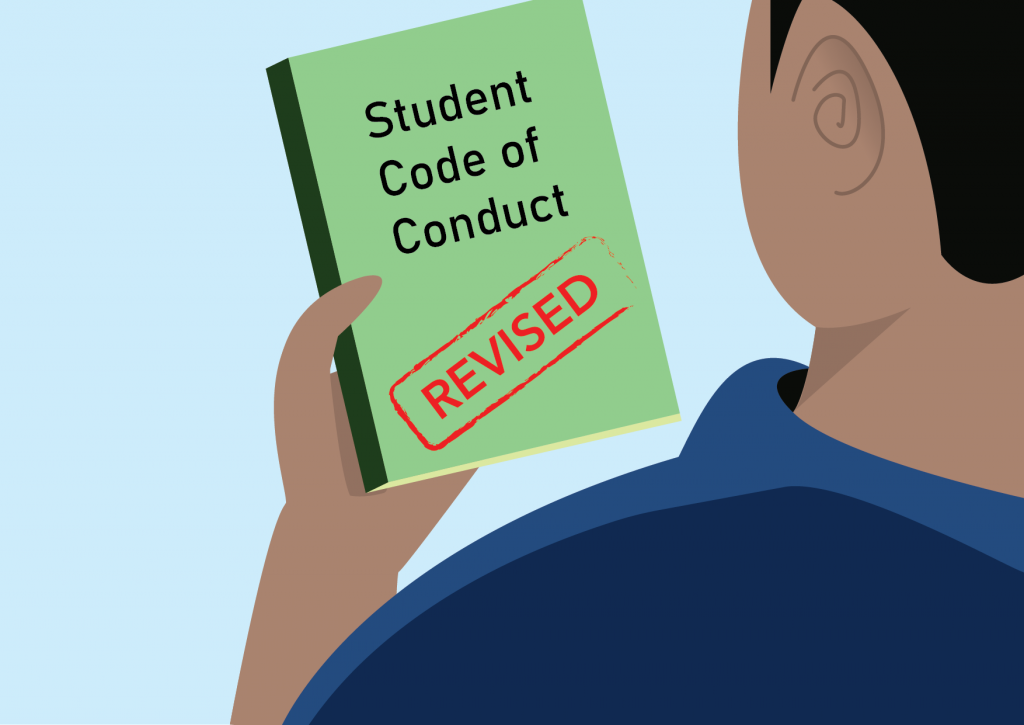The Binghamton University Code of Student Conduct has been revised with new additions as a part of its annual review.
Every April, the student conduct staff performs a review of the Code of Student Conduct which includes adding policies, making edits and rejecting suggestions for possible changes. In a meeting held over Zoom, Jazell Johnson, the BU director of student conduct, spoke about the revisions made to the document this year. She said the staff are constantly looking over the Code of Student Conduct in order to respond to individual cases properly and keep the campus community safe.
“As part of the annual review, students, faculty and staff were asked to review the [current] code and make suggestions for edits for the upcoming academic year,” Johnson wrote in an email. “The [Student Association (SA)] provided a document with proposed changes for consideration. The review committee was assembled to review the suggested changes and make recommendations regarding changes for the 2021-2022 code. Responsibilities of committee members include: review the current code in its entirety and share with the committee any changes you personally are suggesting, review suggestions submitted by various campus constituents — faculty, staff and students — and discuss future next steps that will advance the mission of the University.”
Two new items relating to sexual misconduct cases have been added to the BU Code of Student Conduct. The first item is a revision to the appeal process in sexual misconduct cases. Previously, when a student appealed the outcome of their misconduct case, Johnson said the review board could not increase the sanction imposed upon the student. With the new guidelines outlined in this revision, the review board may affirm and increase the sanction to better fit the student’s offense. Johnson added that this change was made to create a more comprehensive appeal process and better outcomes for sexual assault cases in the future.
“The revision in the appeal section is to ensure we remain in compliance and align with current regulations governing cases of sexual misconduct,” Johnson wrote. “Additionally, this is beneficial to include in the Code of Student Conduct as an option available if it is deemed appropriate for cases as they are reviewed on an individual basis.”
The second revision is in regard to whether prior student violations that called for expulsion can be reported to graduate programs. In the past, Johnson said students who were expelled from their undergraduate studies always had their expulsion reported to future programs. The newest addition to the Code of Student Conduct allows students to create a petition to remove the case from their profile. According to Johnson, this may only be done five years after the date of expulsion. If the petition is denied, then the case may still be reported to future institutions. However, if the person has shown personal growth and progress, then their petition will be approved, thereby clearing their case profile. In the meeting, Johnson noted that petitions are an important tool to allow people to show that they have changed and now deserve a clean record.
Ethan Klayman, a sophomore majoring in integrative neuroscience, believes there are some benefits to the revisions.
“This new change allows for people with infractions to move on from it if they have changed,” Klayman said. “However, in the case of a sexual misconduct case, the case may be gone, but the trauma of the victim may prevail.”
These new changes were created by students, staff and administrators in hopes of better serving the campus community. Gabrielle Schoenberg, a sophomore majoring in psychology, said she thinks student contribution to the Code of Student Conduct is key to ensuring it addresses community concerns.
“As a community, it is important that we all contribute and share ideas,” Schoenberg said. “It is so great that BU is welcoming of student ideas because this allows us to feel like full members of the campus community.”
In the meeting, Johnson described the Code of Student Conduct as an important document for BU. She explained that it should be transparent and clear so students can understand the information being presented.
“The goal of the changes is to provide the reader with information to understand our processes,” Johnson wrote. “It’s our goal that revisions made to the Code of Student Conduct will aid in the reader having a better understanding of what to expect from our process and next steps. It can aid in their decision-making process, both short- and long-term.”



